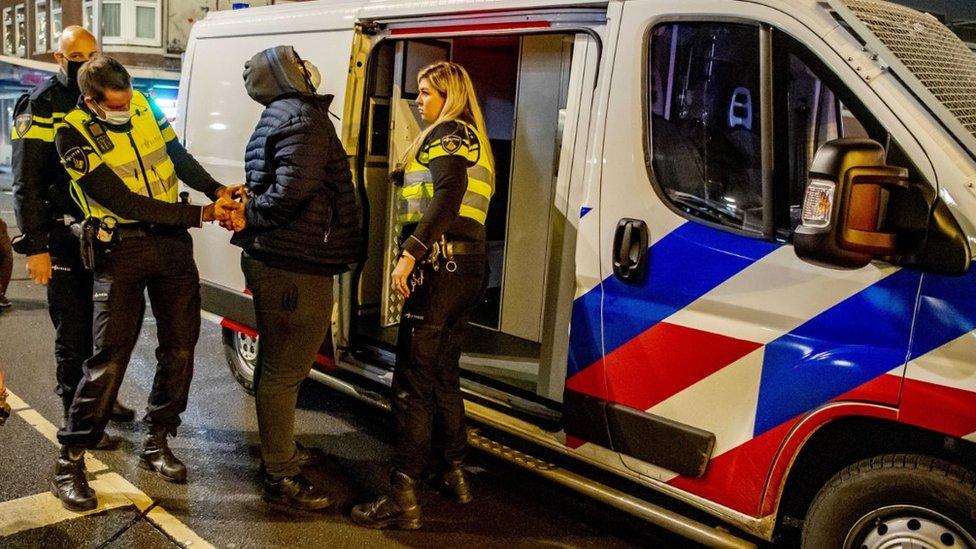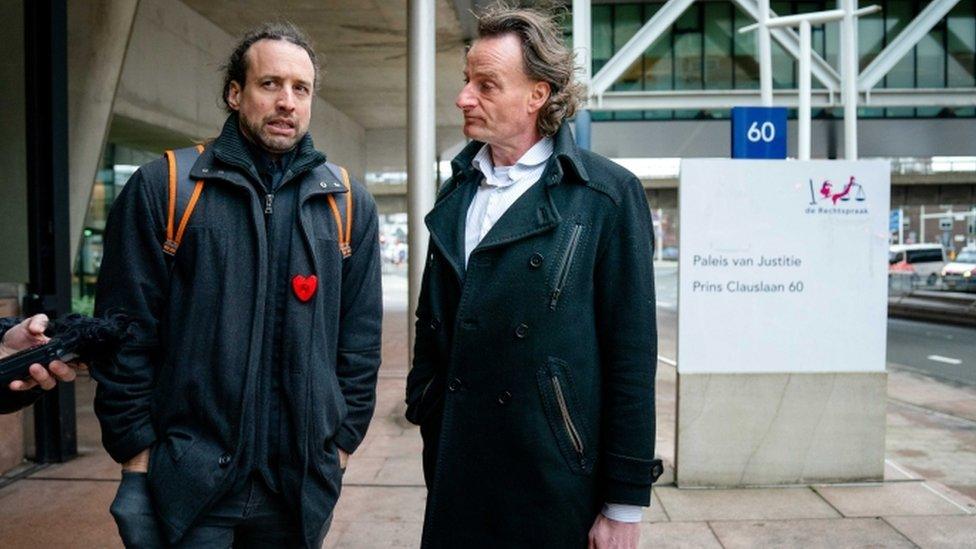Covid: Dutch crisis as court orders end to Covid curfew
- Published

Hundreds of people were arrested across the Netherlands as rioters defied the curfew last month
A court in The Hague has told the Dutch government that an overnight curfew to reduce the spread of coronavirus should be lifted, ruling that it breaches the right to free movement.
The court said the 21:00 to 04:30 curfew was imposed by an emergency law when there was no "acute emergency".
Later, a higher court ruled that the curfew could stay in place pending an appeal on Friday.
The curfew, imposed in January, led to rioting in several Dutch cities.
Police were patrolling streets near the Dutch parliament on Tuesday evening but no unrest has been reported so far.
The earlier court ruling - which said the curfew should be lifted immediately - was a victory for campaign group Viruswaarheid (Virus Truth) and a major upset for the government.
The government quickly asked for the decision to be suspended until an appeal was heard at the end of the week. An appeals court later granted that suspension.
Earlier on Tuesday, Prime Minister Mark Rutte described the ruling against the curfew as a setback and urged people to continue to follow the restrictions, which he said were "simply necessary".
The Dutch cabinet is urgently working on a new law to enforce the curfew, but that could take time.
Curfews have been widely used in Europe to restrict movement. France has had a nightly curfew from 18:00 but has stopped short of imposing a third lockdown. Greece has also imposed curfews, as have Spain and Italy.
Why the curfew is contentious
The Dutch measure, which came into force on 23 January, was intended to reduce movement, particularly among young people, but triggered days of rioting in a number of towns and cities. The Netherlands had not seen a curfew since Nazi occupation in World War Two.
Although the Netherlands initially avoided strict measures, a lockdown was brought in last December and, after the cabinet decided on a curfew in January, MPs backed it days later amid fears that the UK, or Kent, variant would increase infections. The government resigned before last month's curfew decision and now has a caretaker role ahead of elections next month.
Infection rates were slightly down on Tuesday, external, with 2,735 new cases reported in the past 24 hours. But hospital admissions were up and 88 more deaths were reported. Some 629,000 people have received their first Covid-19 vaccine dose since vaccinations began in the Netherlands on 6 January, and of those around one in four have had a second dose.
In their ruling on Tuesday, the Dutch judges said the curfew had been imposed under an emergency law, even though the court said there was no emergency as in the case of a "dyke being breached".
Dutch police described the rioting as the worst unrest in four decades
Fears of increased infection because of the UK variant were not valid as no curfew was imposed last year when pressure on Dutch hospitals was far greater, the judges said.
The curfew was therefore a violation of the right to freedom of movement and privacy, and limited the right to freedom of assembly.
Commentators spoke of ministers having faced a "Catch-22" situation. When the cabinet decided on the curfew they sought the backing of MPs, but by waiting for parliamentary support, in the judges eyes they had disproved the need for emergency legislation.
The case threatened to descend into farce during the afternoon, when Virus Truth spokesman Jeroen Pols accused the lead judge of bias for allowing the government to challenge the court's ruling so quickly.

Unexpected victory for activists

Even the group that brought the case to court, Virus Truth, seemed surprised by its success.
I recently interviewed its Covid-sceptic founder, Willem Engel, in his Rotterdam dance studio. He and his followers are adamant governments around the world are using efforts to control the spread of Covid-19 as a guise to gain control of citizens.
This ruling has emboldened them.

Willem Engel (L) and Jeroen Pols of Virus Truth challenged the Hague court's decision to allow such a quick appeal
The curfew has been one of the most controversial and contested elements of the Dutch lockdown but the majority of the population had accepted and abided by it.
Some people have started planning "after-curfew" parties, though other rules, such as no more than one guest at home a day and a ban on gatherings of more than two people outdoors, remain in place.
While this court victory specifically relates to the Dutch situation, it could be used as a precedent by anti-lockdown groups seeking to overturn Covid-related rules in other countries too.
